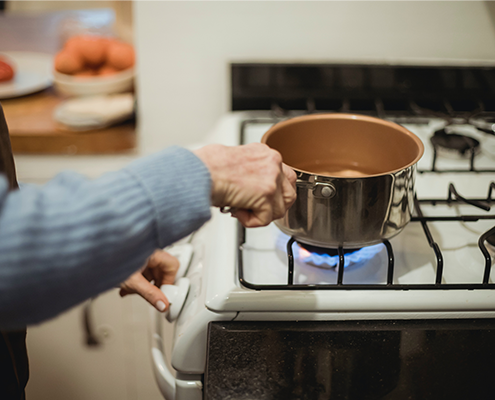Gas Bill Debt Disproportionately Burdens Low-Income Neighborhoods
As California’s utility shutoff ban ends, UCLA research shows where unpaid gas utility bills proliferated amid the pandemic

November 1, 2021
Unpaid bills for heating and cooking gas are unevenly distributed among Californians, according to a new report from the Center for Neighborhood Knowledge at UCLA Luskin in partnership with the Latino Policy and Politics Initiative (LPPI) and the Luskin Center for Innovation.
Since Oct. 1, customers who are behind on utility bills are no longer protected from shutoffs by a statewide order enacted in April 2020 in response to the COVID-19 pandemic. The study reveals clear patterns of inequity: Neighborhoods with high gas bill debt rates also have higher poverty rates, lower incomes, more renters than homeowners and higher proportions of Black and Latinx residents than the average neighborhood served by Southern California Gas.
The research team analyzed data from the utility, which provides gas service to about 50% of California residents. The team found that, as of February 28, 2021, 1 in 5 customers were at least 30 days behind on their gas bill payments, and almost 1 in 10 were at least 90 days behind.
The report provides several lessons for policymakers to equitably relieve the burden of utility debt on customers. The authors recommend improving the data available on utility debt and shutoffs to lead to better-informed decisions. They also note the importance of targeting relief aid at the most affected, lowest-income households.
The co-authors also emphasize a connection between their findings and the growing movement toward building electrification. Transitioning residential buildings to run on electricity alone is significant to avoid greenhouse gas emissions—especially since natural gas is composed primarily of methane, a major contributor to climate change. But this transition may impose high costs on people who already face utility debt.
“When higher-income households stop using gas, lower-income households may be saddled with higher and higher gas costs,” said Silvia González, director of research at LPPI. “It is essential to make electrification equitable, which means households don’t get left behind or stuck with increasingly unmanageable energy costs.”
Because lower-income households could be negatively impacted by the fixed costs of gas service—the costs that don’t go down when there are fewer customers, the researchers advise that more research is needed to understand and mitigate this impact.
This study is the third and final in a series examining utility debt inequity during the COVID-19 pandemic. Previous policy briefs focused on unpaid utility bills among Los Angeles Department of Water and Power and Pacific Gas and Electric Company customers.


